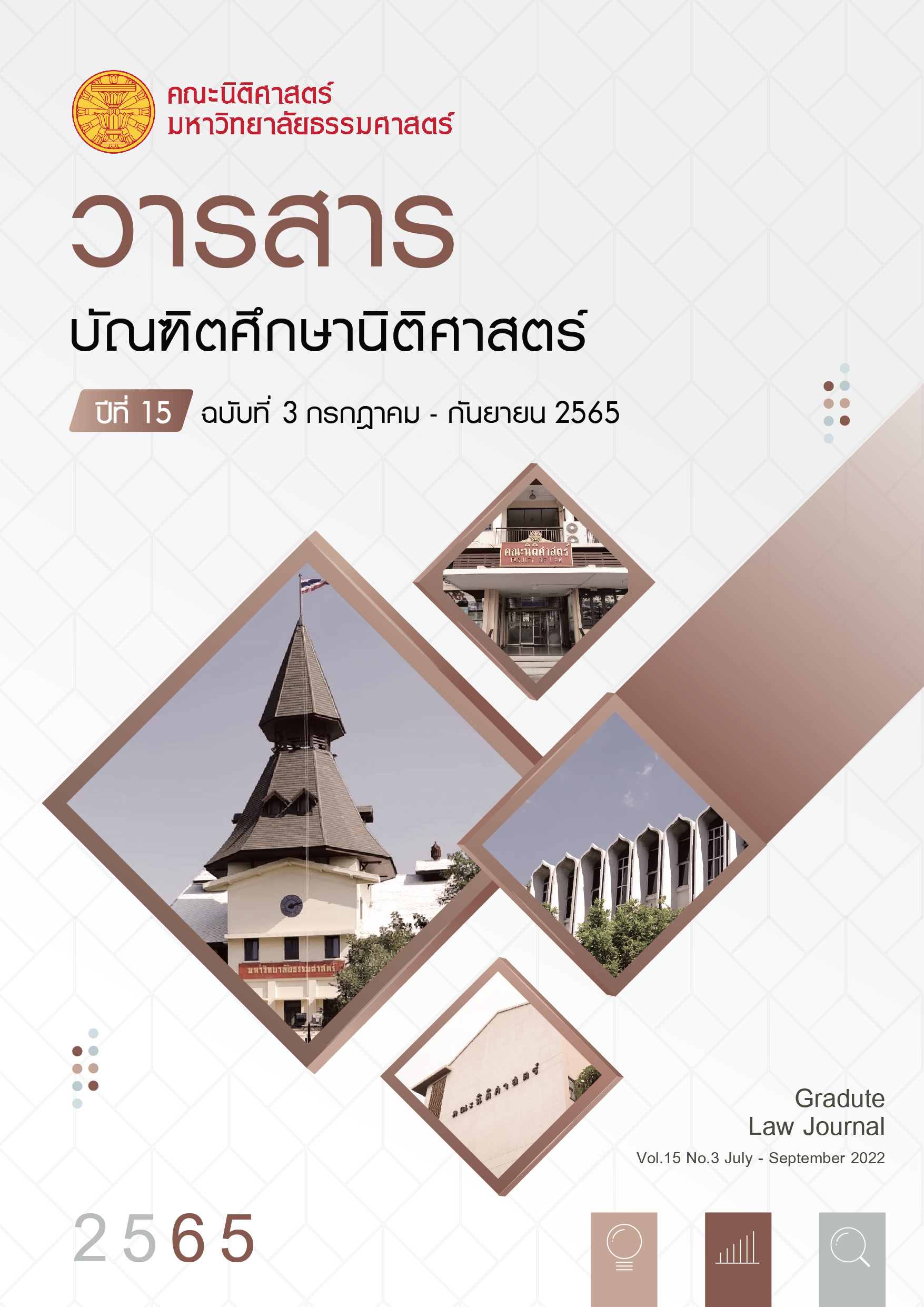NATIONAL ANTI – CORRUPTION COMMISSION SCRUTINY OF NATIONAL LEGISLATIVE MEMBERS: COMMITTING CRIMINAL OFFENSES RELATED TO PERFORMANCE OF DUTIES
Keywords:
Legislative acts, Offences of malfeasance in public office, Code of ethicsAbstract
The Constitution of the Kingdom of Thailand, B.E. 2560 (2017), determines duties and powers of the National Anti-Corruption Commission (NACC) to accuse persons holding political office of malfeasance in Section 234 (1). Section 28 (1) of the Act Supplementing the Constitution Relating to the Prevention and Suppression of Corruption B.E. 2561 (2018) specifies duties and powers of the NACC to accuse National Legislative Assembly (NLA) members of malfeasance, including “inquiring and preparing opinions in case there is an allegation that a person holding a political position is involved in malfeasance.” NLA members are included among political position holders, and the term malfeasance refers to committing offenses against duties under the Thailand Criminal Code (TCC) or other laws. As a result, The NAAC can examine performance of NLA members by evaluating characteristics of offenses against duties under Chapter 2 of the TCC, offenses against duties in all chapters from Sections 147 to 166 or other laws, especially Section 172 of the Organic Act, where the offense resembles Section 157 of the TCC, allowing the attorney general to file a lawsuit with the Supreme Court's Criminal Division for Persons Holding Political Positions to convict and impose penalties if performance of duties in using legislative powers, and some offenses against official position and duties are inconsistent with performance of duties of NLA members.
Results were that offenses against official position and duties were intended to apply mainly to those exercising executive power, especially administrative power. However, if any section is required to cover the exercise of legislative power, it will be specified. As stipulated in Section 149 of the TCC, the word “officer” is defined as pertaining to wrongdoers in the category of offenses against official position and duties, but does not include exercise of legislative power. In addition, NACC roles, duties and powers are mainly focused on investigating corruption in the use of state authority by seeking benefits for oneself and others. In addition, exercising powers and duties of an NLA member may be divided into two cases: actual legislative action or using state authority to enact laws within the state related to the parliamentary legislative process, and administrative control and inspection of executive branch state affairs as well as exercising constitutional powers, or high-level public law defining actions by prominent political organizations dealing with the relationship between parliament and the executive branch. For other actions, an NLA member performs duties using powers other than actual legislative action as an exercise of political power. In principle, the court will not investigate and control such actions
Furthermore, when considering control and investigation of criminal offenses related to performance of NLA duties in Japan and the United States, offenses related to corruption are specifically defined, mostly as bribery-related. The Singapore and the Hong Kong Special Administrative Region has established an organization specifically responsible for investigating corruption, akin to Thailand’s NACC. Applicable offenses would only include NLA member bribery.
This article suggests that when the NACC applies offenses against official position and duties under the TCC to examination by NLA members as malpractice, those genuinely related to corruption should be targeted, consistent with performance of legislative duties. Also, the scope and characteristics of actions by NLA members that the NACC should examine must not involve actual exercise of legislative power or use of power in the form of group organizations, except for offences in which an official demands, accepts, or agrees to accept a bribe according to Section 149 of the TCC. The NACC is unable to control and examine actions by NLA members for exercising actual legislative power to carry out criminal measures. In the aforementioned cases, ethical control and review measures should instead follow the Regulations on the Code of Ethics.
References
บรรณานุกรม
หนังสือ
คณิต ณ นคร, กฎหมายอาญาภาคทั่วไป (พิมพ์ครั้งที่ 6, สำนักพิมพ์วิญญูชน 2560).
จิตติ ติงศภัทิย์, กฎหมายอาญา ภาค 2 ตอน 1 (พิมพ์ครั้งที่ 8, สำนักพิมพ์จิรรัชการพิมพ์ 2548).
ชาญชัย แสวงศักดิ์, คำอธิบายกฎหมายปกครอง (พิมพ์ครั้งที่ 28, สำนักพิมพ์วิญญูชน 2562).
ทวีเกียรติ มีนะกนิษฐ, ประมวลกฎหมายฉบับอ้างอิง (พิมพ์ครั้งที่ 38, สำนักพิมพ์วิญญูชน 2560).
นิยม รัฐอมฤต และคณะ, จรรยาบรรณสำหรับสมาชิกรัฐสภา การศึกษาเปรียบเทียบ (พิมพ์ครั้งที่ 1, สำนักพิมพ์ ส เจริญ การพิมพ์ 2552).
บวรศักดิ์ อุวรรณโณ, กฎหมายมหาชน เล่ม 3 ที่มาและนิติวิธี (พิมพ์ครั้งที่ 1, สำนักพิมพ์นิติธรรม 2538)
พรสันต์ เลี้ยงบุญเลิศชัย, แนวความคิดและหลักการว่าด้วยการละเมิดอำนาจรัฐสภา (พิมพ์ครั้งที่ 1, ศูนย์การพิมพ์แก่นจันทร์ 2558).
วรเจตน์ ภาคีรัตน์, คำสอนว่าด้วยรัฐและหลักกฎหมายมหาชน (พิมพ์ครั้งที่ 3 แก้ไขเพิ่มเติม, สำนักพิมพ์อ่านกฎหมาย 2564).
สมยศ เชื้อไทย, หลักกฎหมายมหาชนเบื้องต้น (พิมพ์ครั้งที่ 9, สำนักพิมพ์วิญญูชน 2556).
รายงานผลการวิจัย
วีระพงษ์ บุญโญภาส และคณะ, ‘โครงการศึกษาวิจัยเรื่องการเสริมสร้างมาตรการเพื่อสัมฤทธิผลในกระบวนการบังคับใช้กฎหมายของคณะกรรมการ ป.ป.ช.’ (รายงานผลการวิจัยเสนอต่อสำนักงานคณะกรรมการป้องกันและปราบปรามการทุจริตแห่งชาติ 2550).
สมชาย ธรรมสุทธิวัฒน์ และฉลองรัฐ เจริญศรี, ‘วิเคราะห์ อำนาจการสอบสวน และประสิทธิภาพการทำงานตามกฎหมายป้องกันและปราบปรามการทุจริต : ไทยกับสิงคโปร์’ (รายงานผลการวิจัยเสนอต่อมหาวิทยาลัยแม่ฟ้าหลวง 2558).
--, และคณะ, ‘โครงการการพัฒนาความร่วมมือและยกระดับการป้องกันการทุจริตในประเทศไทย: ศึกษาประสบการณ์ประเทศญี่ปุ่นและเกาหลีใต้’ (รายงานผลการวิจัยเสนอต่อสำนักงานคณะกรรมการวิจัยแห่งชาติและสำนักงานกองทุนสนับสนุนการวิจัย 2561).
สุรพล นิติไกรพจน์ และคณะ, ‘คณะกรรมการป้องกันและปราบปรามการทุจริตแห่งชาติกับการตรวจสอบการใช้อำนาจรัฐตามรัฐธรรมนูญ’ (รายงานผลการวิจัยเสนอต่อสำนักงานคณะกรรมการวิจัยแห่งชาติ 2546).
แสวง บุญเฉลิมวิภาส และคณะ, ‘การศึกษาพันธกรณีและความพร้อมของประเทศไทยในการปฏิบัติตนตามอนุสัญญาสหประชาชาติว่าด้วยการต่อต้านการทุจริต ค.ศ. 2003’ (รายงานผลการวิจัยเสนอต่อสำนักงานคณะกรรมการป้องกันและปราบปรามการทุจริตแห่งชาติ 2551).
อุดม รัฐอมฤต และคณะ, ‘โครงการศึกษาความเหมาะสมในการปฏิรูปกฎหมายที่เกี่ยวข้องกับการกระทำความผิดต่อตำแหน่งหน้าที่ตามประมวลกฎหมายอาญา มาตรา 157’ (รายงานผลการวิจัยเสนอต่อสำนักงาน ป.ป.ช. 2555).
วิทยานิพนธ์
คริษฐา ดาราศร, ‘ปัญหาการบังคับใช้ประมวลจริยธรรมของสมาชิกรัฐสภา ตามรัฐธรรมนูญแห่งราชอาณาจักรไทย พุทธศักราช 2540 ศึกษาเฉพาะกรณีการขัดกันระหว่างผลประโยชน์ส่วนตนกับผลประโยชน์สาธารณะ’ (วิทยานิพนธ์ นิติศาสตร์มหาบัณฑิต จุฬาลงกรณ์มหาวิทยาลัย 2548).
ญาดา กาศยปนันทน์, ‘การกำหนดมาตรการทางกฎหมายในการตรวจสอบความเคลื่อนไหวทางการเงินของบุคคลที่มีสถานภาพทางการเมืองเพื่อการป้องกันและปราบปรามการทุจริตของไทย’ (วิทยานิพนธ์ นิติศาสตร์ดุษฎีบัณฑิต มหาวิทยาลัยธรรมศาสตร์ 2554).
รายงาน คู่มือ หรือเอกสารที่ออกโดยหน่วยงานต่าง ๆ
สำนักงานคณะกรรมการป้องกันและปราบปรามการทุจริตแห่งชาติ, รายงานประจำปีงบประมาณ พ.ศ. 2560 ของคณะกรรมการ ป.ป.ช 2561 76 < https://www.nacc.go.th/files/article/attachments /main_old_article_
pdf>
รายงานการประชุม
คณะกรรมาธิการวิสามัญกิจการวุฒิสภา, บันทึกการประชุม ครั้งที่ 9/2563 (22 เมษายน 2563).
เอกสารอื่น ๆ
บริษัท มติชน จำกัด (มหาชน), ‘ป.ป.ช. ชี้มูล “ประสิทธิ์ ส.ส.เชียงใหม่” กรณีฮั้วงานสร้างสนามฟุตบอลโกลหนู สตรีทซอคเกอร์ งบ 30 ล้าน’ (MATICHON ONLINE การเมือง, 16 กรกฎาคม 2564) https://www.matichon.co.th/
politics/news_2832737 สืบค้นเมื่อ 6 กันยายน 2564.
เวิร์คพอยท์, ‘เปิดเบื้องหลัง ป.ป.ช.ชี้มูลความผิด 4 ส.ส.ฝ่ายรัฐบาล คดี ‘เสียบบัตรแทนกัน’’ (workpointTODAY,
มิถุนายน 2564) < https://workpointtoday.com/politic-9/> สืบค้นเมื่อ 23 สิงหาคม 2564.
องค์การกระจายเสียงและแพร่ภาพสาธารณะแห่งประเทศไทย, ‘ป.ป.ช.ชี้มูล "อนุรักษ์" เรียกรับเงิน 5 ล้านบาท กรมน้ำบาดาล’ (Thai PBS NEWS, 1 ตุลาคม 2564) < https://news.thaipbs.or.th/content/308289> สืบค้นเมื่อ 24 ตุลาคม 2564.
Downloads
Published
Issue
Section
License
Copyright (c) 2022 Graduate Law Journal

This work is licensed under a Creative Commons Attribution-NonCommercial-NoDerivatives 4.0 International License.
บทความหรือข้อความคิดเห็นใด ๆ ที่ปรากฏในวารสารบัณฑิตศึกษานิติศาสตร์เป็นความรับผิดชอบของผู้เขียนบทความโดยเฉพาะ คณะนิติศาสตร์ มหาวิทยาลัยธรรมศาสตร์ และกองบรรณาธิการไม่จำเป็นต้องเห็นด้วย



